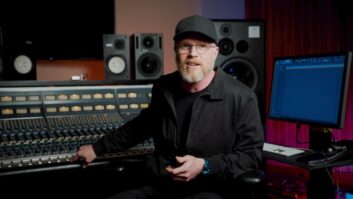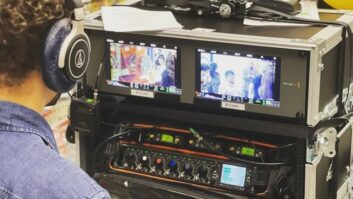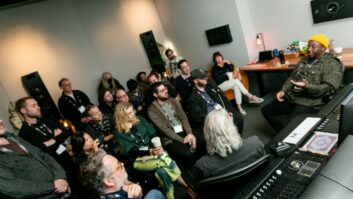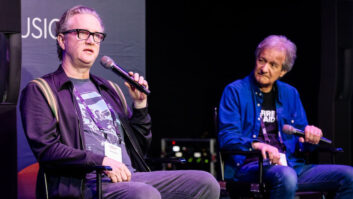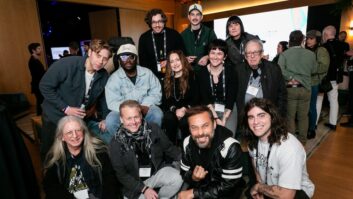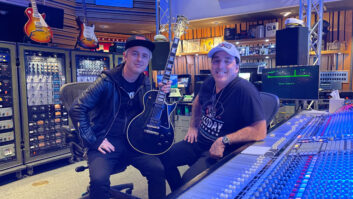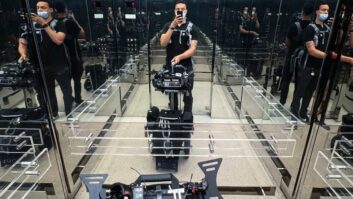Walking west on 54th Street in New York City, between Ninth and Tenth avenues, I see on the right the new Hit Factory while aiming for Sony Studios up ahead on the left. Just a block over is the once-famous Power Station, now revibed as Avatar Studios. It’s the end of a record-breaking hot day in the city, around 8:30; the sun is setting, and it’s still 85.
In an era where the home studio flourishes and many larger facilities have given way to one-room project studios, I realize that I am no more than five minutes’ walking distance from at least ten of NYC’s top, constantly booked, premier Big Rooms-Right Track, Sound On Sound, Quad, Daddy’s House and more. These rooms have survived, and now thrive, even though the Music has died, that Music being traditional rock ‘n’ roll, which ruled the ’80s and kept these Mega Flagship Studios afloat. It was that rock ‘n’ roll glamour that brought a lot of people into The Game in the first place.
The street is now lined on both sides with SUVs, with top-shelf, loaded, customized Navigators, Expeditions, Lexuses, Jeeps, etc. As I approach, I can hear one Jeep banging sound loud enough to shake the buildings, filling the whole block with sonic boom. There must be 15 to 20 people just hangin’, chillin’ outside Sony Studios and across the street.
Some are in session, and some are there to be a part of sessions. I suddenly recognize the song as I hear Missy Elliott singing a hook I recorded with her two nights earlier. The rapper on the track is Eve from Ruff Ryders, and the person playing the beat is none other than Swiss Beats, one of the hot, new hip hop producers on the scene. He’s in the middle of mixing this Tune, and in the new tradition of hip hop recording, he’s appealing to the Community for mix approval. It’s as much about Vibe as EQ.
It seems that since the early ’90s, when the big rooms began feeling the threat from the smaller rap studios, NYC became a rock ‘n’ roll ghost town, undergoing a major metamorphosis and emerging a hip hop Mecca.
During the same time, I came to notice that the craft of audio engineering in the hip hop world had changed, and I’ve had to alter my style of making these records and my role as an engineer.
I went to visit with some of my compatriots (those who were available at post time) and found an informative view of the changing role of engineering from New York’s Finest, Class of the ’90s, Millennium Closers, the Hip Hop Magnificent Seven, Engineers for Hire.
THE PLAYERSJimmy Douglass, moderator: Aaliyah, Timbaland, Ginuwine, Missy Elliott
“Prince Charles” Alexander: Notorious B.I.G., Puff Daddy, Mary J. Blige, Mase
Ken “Duro” Ifill: Will Smith, Jay-Z, DMX, Ruff Ryders
Tony Maserati: Puff Daddy, Mariah Carey
Bob Power: Erykah Badu, D’Angelo, The Roots, Tribe/De La Soul
Tony Prendatt: Lauryn Hill, RZA, Wu-Tang Clan, Wyclef Jean, Public Enemy, Canibus, Mary J. Blige
Joe Quinde: KRS-One, Noreaga, Fat Joe, Jay-Z
Why New York? What’s here?
Alexander: Here in New York, you walk out the door, and you can see anyone. New York, being a cultural melting pot, is a mirror image of what hip hop has become, a cultural melting pot.
Maserati: New York vs. L.A.? I don’t feel as much of the sense of Community in L.A. There is no hang thing there. It wasn’t the same because the session guys weren’t the producers. They were the players, and that’s one of the things that has changed a lot in New York hip hop.
In a genre of music generated mostly by samples, sequences and very few live musicians, do you really need these big rooms to mix in?
Power: All I want out of a room to mix in is enough inputs, a console that doesn’t sound terrible, and a place where s- works and the quality is maintained.
Alexander: The producer’s aural experience is heightened [in a big room] because there are large monitors in a large space, and he can hear it like he’s in a club. I believe that aural experience is necessary for hip hop production. It’s not necessarily what I need, but it’s good for the producer. And then there’s the psychological element of being in a successful environment and all that. So I don’t think the big rooms are gonna disappear.
Prendatt: Hell, no…but the Community does. The clients in hip hop need to hype themselves, need to amp themselves, to charge themselves in a way they do not achieve being at home listening on an 80-watt or a 100-watt system and a set of little speakers.
Quinde: Probably not, ’cause sometimes you make the beat at home and, using a Finalizer or something, put up the raw stuff and it’s got more of what you want than if you mixed and tweaked something in a big place for ten hours. But it’s more enjoyable to mix in the big rooms. I think the listeners, and the producers and the artist, are finally liking good sound, whereas six years ago they would be like, “What are you doing to my mix? You’re making it sound too nice.”
The large room also holds the Community. I rely on it too sometimes, ’cause when I play the mix I want everybody to rock. It’s a necessity to have the people in the room. You’re kinda seekin’ their opinion, and sometimes your best critic will be the passing-through visitor who will comment, “I don’t like it.”
Maserati: Do I really need all this gear and big rooms? No, but I have to have the best equipment I can get: I want a J9000, or a full-blown VR. I need the Edge.
Back in the day, doing rock sessions, we’d set a start of 11 a.m., all show up by 1, and work till 1 or maybe 2. How are the hip hop hours ?
Maserati: The hip hop hours are around the clock-you know that as well as I do-and luckily we’re in a position where we’re sought after, so I can suggest, when asked: “I wanna work at noon, I wanna work at 1, and I wanna get it done by 2 a.m. or 3 a.m.” You know what I’m saying?
I know what you’re sayin’, but do they know what you’re sayin’?
Maserati: No! I have to be the one to promote going in during the day, while I’m alive, while I’m awake. They still have an around-the-clock schedule. I mean, if I’m lucky I’ll finish with Puffy at 2 in the morning, and he’s got somebody else coming in right behind me to do another session. He may not be there, but he’s got his staff there. The nature of the business is when you’re hot you’re hot, and you do everything you can to keep the ball rolling. And they’re doing it. I’m doing it. You’re doing it. You’re trying to fill in as many hours as you can stamina-wise deal with.
I don’t wanna work seven days a week, 20 hours a day, and my clients are cool with that. So I work six days a week, 17 hours a day. (Laughs.)
Power: I wish there was a way to make records between 10 a.m. and 8 p.m., but it doesn’t work that way. You always end up with these 12- to 16-hour days.
Prendatt: It’s overwhelming, but you deal with it ’cause you’re there to do the job. I work a minimum 14, maximum 22 hours on a shift. Turnaround time if you’re doing steady into a project is max six to seven hours, and it runs minimum six, max seven, days a week. Those are project hours.
Alexander: There were days back with Jodeci, Father MC, Heavy D, we would sleep in the studio. I think true hip hop is 6 p.m. to like 9 or 10 the next day. I like to think I do pop hip hop, I’m lucky cause my hours are more like 12 noon to 2 a.m.-hip hop banker’s hours.
Quinde: The hours are endless. It’s been one big mix for the last seven years, practically. One big day could last seven years. A 15-hour day is an average day; a ten-hour day is a half-day.
In R&B and hip hop, has the line become one and the same because of the people and the Vibe? I’m calling hip hop and R&B the same.
Maserati: If they’re singing on it, and that’s all that’s on it, then it’s R&B. But the actual clientele is the same.
Alexander: The closer hip hop gets to pop it starts bleeding over into R&B.
Duro: Hip hop has fused with R&B, and any hip hop engineer should do the same.
DIGITAL OR ANALOGIn hip hop, many times we are dealing with a 2-track loop that might have come off of someone’s cassette, an old scratchy record, noisy as heck. It’s dirty, it’s grungy, and suddenly we’re going to digital, when in fact those analog edges might have smoothed it out quite nicely. Do you have a preference, analog or digital?
Power: Whatever gets you there. Sometimes it requires digital, and sometimes it doesn’t. I know when I’m making a hip hop record and people start talking the word digital, I say, “Why?” Sometimes it’s cost-effectiveness. I’ll stay with two 2-inch reels for the whole project, and you know, it’ll add an extra year onto your life while you mix, waiting for lockup. But in the meantime, I will have thrown things to Pro Tools, thrown ’em back or keep it in there-run it virtual. Whatever gets it done. Certain kinds of music lend themselves better to stay in digital, and I don’t think hip hop is one of them. Still, I insist on having it available.
Maserati: I didn’t like digital until Pro Tools|24. There are a lot of conveniences creatively. Many people in hip hop are embracing it so quickly-boom, just like that, everybody’s into it. I’m very surprised. It took me five years to convince the guys I work with to use a Zip drive instead of a floppy disk.
Alexander: In the pop hip hop thing, there’s always been this need, desire, this want, to make samples sound clean and great. In the pure rap hip hop, they want it dirty. I’m not really an advocate of changing sound drastically. If you came to me with something that sounds like it came from a cassette, I’d think that’s really how you wanted it to sound. So if you weren’t there when I mixed it, it’ll probably sound exactly the way you gave it to me. I don’t believe that I know what’s right about the sonic process. All I wanna do is service what your vision is. It’s like being a camera man-you capture.
Prendatt: I prefer to work digital-speed and ease. There is a marked difference between analog and digital and how it treats the low-end necessities of hip hop music overall. But we also live with the fact that as technicians, it all ends up digital by the time it gets to the consumer.
Since automation and recall rule the day, and we’re not always available to redo our own work, how do you feel about other people getting hold of your recall and being able to mimic your little secrets-and even put their name on it? Alexander: At first I didn’t like it. I think it’s disrespectful to those of us that call ourselves mix engineers. I think because of the whole hip hop perspective on engineers, it’s kinda like we are butlers-“a little more reverb, sir?” It’s not gonna go away, ’cause that’s how the producers and record companies view our work. Our work is that interchangeable, for many of them, and I’ve had my opportunity to mix some other people’s recalls and put my name on it, too. So if you stay in The Game long enough and if yours gets recalled, somebody puts their name on it. You get a recall, you put your name on it. I don’t know how to solve this riddle.
Do you believe only you can do what you do?
Prendatt: Nope. The next guy’s waiting right around the corner, and I start each day by asking myself what I can learn today.
Power: Absolutely not. There’s a lot of people that do what they do, and I do what I do. The nuances are different, but nobody gives a hoot about that. Basically, our point is to bring forth the musical expression in as cool and digable and bold a way as we can.
Duro: Yes. It’s just like a painter. No two painters are gonna paint the same picture. It’s all a Vibe thing, and everyone hears things differently.
In the image of the traditional rock ‘n’ roll session, the engineer does certain functions-EQ, effects, etc. Do you find, more and more, that part of your job is a little more than just manning the console, that the MIDI gear, sync and other issues are now included in your tasks as well? It seems the hip hop/R&B world has created a new breed of engineer/mixer with traits that heretofore were called production-overseeing vocals, moving parts and flyin’ stuff around.
Quinde: True. Taking more of the responsibility makes it easier for them to rely on us because the artist and the producers-who wanna be the artist-are very high-profile these days. And just like the artist, it’s very easy to aggravate [producers]. You gotta treat them just like the artist and make their day go just as smooth.
Maserati: It’s gotten different. Five years ago when producers used to come in, the first job I had to do was program their song, and my assistant turned out to be my engineer. The second job would be like flyin’ vocals.
It’s very rare that they’ll bring any piece of equipment in that I won’t put my hands on. Any kind of new synth or sequencer, I’ll mess with it. You gotta know the boxes. That’s been my thing from the beginning, when I started working as an engineer with Full Force. I was the only guy in the studio who knew how to use the S900, the S550 or the 808 or things like that, ’cause I was the only one who cared. The rock ‘n’ roll guys thought it was bullshit, and I thought it was cool. Now the younger rock guys that I know, they all have sequencers; they all know how to use sequencers and Pro Tools kind of stuff. I don’t think the rock guys are not into it; I think that they are just getting into it. They don’t have the need for it as much, whereas what I do, it’s from day one.
Alexander: Yes. It spills over into MIDI programming and now Pro Tools work. I’m amazed that anyone can hold down the type of gig that I hold down and not know all those boxes. If you’re gonna sit in my seat, you better know a whole lotta stuff.
The MIDI question is related to Pro Tools. It was the same as knowing a lot of buttons. It’s off the console. I’m sittin’ there staring at this little screen, when we’ve had 50 years to develop this lush console. Now I’m sitting over here with this little screen and using this $500,000 console as a monitoring device.
Prendatt: If you’re going to be a successful engineer in the genre we’re working in, you have to know how to produce records, and that is how you will best function and best be recognized. You also have to have some working knowledge of all the equipment around you, all the MIDI. You have to think with a musician’s hat, you have to think with a technician’s hat, as well as with an arranger’s hat, from the perspective that a lot of the producers are young. They are MPC-oriented producers and not necessarily musically trained, and they depend on your help and guidance in order for the job to get done right and cost-effectively.
Power: A lot of my earlier work that I engineered, and/or mixed, I did the lion’s share of both the MIDI programming, the hands-on stuff-not creating the artist’s stuff, but making it happen-as well as vocal flys and all that. I tell kids coming up now, especially in this town, “If you wanna move ahead as an engineer, be fabulous with MIDI, and you will save people’s ass constantly, and they’ll always come back to you.”
Duro: I play sequencers. I do productions. I’ve done beats since eighth or ninth grade. You are expected to do everything-MIDI, sync, etc. The more gear you know, the more you work. I started in the MIDI room.
THE CREATIVE TEAMDo you find that the entourage is necessary for the artist’s creative process?
Alexander: I think it’s a very important part of the process. I think without an entourage, you have a solitary person dealing with a solitary message, and the music we work on these days is more of a cultural expression than a musical expression, and the culture is there to be shared. So the more people involved in disseminating the culture, the closer you can actually get to it. Most of the best engineers know the creative thing is the most important thing in the room. Anything I can do to help the creative flow, I wanna do.
Figuring out what’s a good EQ, the good gate ratio and compression ratio, is done in a solitary space. And once a whole lot of people get into the room, I want them to enjoy their experience in the room-play cassettes, play DATs. They work hard to get the money to have these experiences, and in addition to making great product that will sell, I want them to have a good time. The amount of time I really need to mix a record is not really the bulk of the time I’m in the room. There’s a certain portion that I know early in the day, when I know I’m gonna get 90 percent done of what needs to be done. The rest of the day I’m really there to make sure that the room doesn’t blow up, the console doesn’t blow up, nothin’ gets spilled on the console, and that my work, whatever I have done during the day, stays intact. I’m making sure people aren’t touching faders.
Quinde: It’s a common thing to have ten to 15 people in the room while you’re working or mixing, even though only one or two of them is actually doing the work. The peers being in the room is helpful when they’re dropping their lyrics or making their beats. The peers are actually the public, and they bounce it off of them, and, of course, if it’s whack and they don’t like it, they let ’em know.
Maserati: I love it. I dig an audience. I’m lucky enough to get the respect in the way I run my room, and that respect trickles down to everybody in the room, and I try not to take advantage of that. So I allow all the people that they invite in as long as they do it within my parameters. They can joke, we can have fun, we can watch a ball game, but when I need to concentrate, when there’s a vocal being done, when the artist is in the room, everybody shuts up or gets out.
Prendatt: The control room in the hip hop environment is usually a much more social and populated situation than the traditional control room environment. That’s the nature of the art, it’s part of the culture that goes with the art, and we as engineers have to accept that as part of the job, working with it and around it as best we can.
The rules of production have changed; the rules of engagement in that environment have changed. We as the workers for hire, we as the servant of the client, are mandated to make changes. We as engineers and technical support have to make adjustments according to a changing market. You gotta work fast; you gotta think fast; you gotta have your trick bag in hand and know what you’re going for.
The word “control” in control room-how do you maintain the respect?
Prendatt: My basic term is very simple: When I need the control room vacated and quiet, everyone respects that, and when they need to be able to have their support crew in the control room, they can. On a mix, I clear the control room.
Maserati: To me, it’s a positive. I haven’t lost control, I gained an interaction, and music is about interaction.
Alexander: The whole entourage thing doesn’t happen till about 6 p.m. The first few filterings of crew might come and see me in the room, and they do an about-face. They just know that this is not the play room when I’m here working alone. Then when the King arrives-whoever that might be, the producer or artist, the King of that environment-they bring the entourage around with them.
Duro: I won’t work with the thousand-people posse environment. When I’m working, I need everyone to get in the lounge. If everyone won’t get in the lounge, I’ll go shopping. I don’t play that, ’cause at the end of the day, the credits won’t say, “Mixed by Ken ‘Duro’ Ifill, with 50 people standing behind him playing cards and talking.” It’s just gonna have my name, and people are gonna be like, “Yo, this boy’s fallin’ off. What the heck was that?”
Your thoughts about the level of the craft?
Power: The level of engineering has gotten better and better. It really bothers me the lackadaisical attitude a lot of people have toward engineering hip hop, because they say, “Oh, it’s just rap. They don’t care. They don’t know the difference.” It’s opportunistic; it’s somewhat racist; it’s dishonest. You and I both know that we’re here to help people’s dreams come true, and it’s a very sacred trust. The attitude that some practitioners have, as well as the engineering community at large, even though they don’t do hip hop, the attitude toward it is that it doesn’t matter.
I used to get all the time: “Oh, you’re mixing mostly rap. That must be easy.” And they don’t understand it’s just the opposite, particularly in the old days when you’re just dealing with a loop, and you gotta pull everything outta one loop. You really learn how to use an equalizer.
Quinde: A scientist I’m not. A technician I’m not. I play the mixing console pretty much ’cause I’m a musician. I am not like some of the classic engineers. They’re knowledgeable technically, I’m a Vibe-ist. I’ll even sometimes mix with my eyes closed.
Power: I love it when there’s kids coming up, especially producers, who “don’t know what they’re doing,” and they come out with shit that’s so cool and inventive. It’s one of the things that I think is a great benefit to both of us; we’re both constantly working with new people, with new ideas, and we’re forced to adapt to new ways of working.
Quinde: Everybody’s job is pretty equal, almost from artist down to the sound. It’s a big team effort, I think.
Alexander: The smile comes on my face when I get that phone call: “We’ve tried everything. We mixed it once. We mixed it twice. We mixed it three times…Can you please mix this record for us?” You gotta make it sound competitive.
Maserati: One of the things I find works for hip hop, and maybe even rock to an extent, is whenever hip hop starts to sound too sophisticated, there’s something wrong. The engineer always wants things to be right, if there is a right, and being right doesn’t mean it’s the best thing for the music. Ninety percent of the engineering in hip hop is being invited to the party and being part of the Community, more than the actual dBs and technicalities.
If you ain’t feelin’ it, then you probably shouldn’t be in it. To change gears, I was stuck upstate for two years in a studio where they had no 11/44- or 11/42-inch machines, so I got used to mixing to DAT only. I still do. What do you mix to?
Quinde: I go through a 11/42-inch first-get that little squash. Then to a DAT master.
Prendatt: I mix to 11/42-inch analog, no noise reduction, 30 ips, because that’s your last bastion of fatness. And DAT.
Alexander: I love to mix to 11/42-inch and DAT, lately storing them in Pro Tools.
Maserati: Mix to 11/42-inch and DAT simultaneously. Master from the 11/42-inch.
Duro: I prefer analog ’cause of what it does to the low end, tape compression. I mix to 499 11/42-inch analog. Even DATs I take off the repro head of my 11/42-inch. I prefer to use the ATR-102.
Power: I mix to 11/42-inch and DAT, and back into my 24-bit Pro Tools/Logic Audio, with an Apogee front end.
My favorite studios in town right now are Sony B, Sound On Sound A, Avatar C, Manhattan Center 4. What do you guys like?
Duro: Sound On Sound B Room with a J. Right Track J. Sony Studio D-J room. Platinum Island.
Alexander: Hit Factory. Battery. Quad 9000-my Home Room.
Power: Sony C and D. Battery-I’m comfortable with the assistants and the gear.
Prendatt: Hit Factory-the J9000 room in the new building. Right Track. Battery.
Quinde: Right Track. Sound On Sound.
Consoles of choice?
Duro: Analog SSL J9000-allows you a lot of corrective EQ, as opposed to Neve, which is rounder. I like more of an aggressive sound.
Alexander: SSL 9000, Neve VR, SSL 4000/6000, SSL Axiom.
Quinde: SSL J, Neve.
Prendatt: Analog SSL J9000. They’ve mastered the electronics; it’s not a G
Series or E Series game anymore. Digital? Capricorn, Pro Tools.
Monitors of choice?
Alexander: Boxers, NS-10s.
Prendatt: I love well-tuned Boxers. For near-field mixing, Auratones with NS-10s as a second.
Quinde: Augspurgers. But I’ll mix in a toilet as long as they can facilitate my equipment. Near-fields: Genelec S33.
Duro: Augspurgers.
Your favorite artist/producers?
Prendatt: Isaac Hayes, Quincy, Lauryn Hill, Tupac, Dr. Dre, Erykah Badu, D’Angelo.
Power: Q-Tip, Ali-Shaheed Muhammad from Tribe, Me’Shell NdegeOcello, The Dust Brothers.
Alexander: Producers? Dr. Dre, Teddy Reilly, Puff Daddy. Artists: Biggy Smalls, Missy and Timbaland put a signature sound on this genre of music.
Duro: Tribe, De La Soul.
Maserati: Mary J., Mariah, Faith Evans, Robert Kelly.
Quinde: Jay-Z, Nas, DMX.
In a market where the music is being made by 90 percent minorities, isn’t it interesting that the service world that caters to them has maybe only 10 percent employment of such?
Maserati: I think that until recently there’s been less young black people interested in walking in that door and being a trainee. I think the trend is changing. See, my heroes were Bob Clearmountain, Roger Nichols, Bruce Swedien, people like that. The young African American heroes are Puff Daddy, Teddy Reilly, and people like that, so they tend to wanna be the producers, the music makers. I think the technician thing is a new thing for young black guys.
One of the problems I had with the traditional studio world-the “rock ‘n’ roll” world-is that it is a closed system. Rock ‘n’ roll, or classical or jazz, is considered the only viable engineering, and if you weren’t recording live music, then you weren’t an engineer. Making music is not about color. That’s the bottom line.
Duro: Young urban kids don’t have the outlets. All they see is what they see on television. That’s why I’m interested in doing some type of press stuff to let the young kids know that there’s other things you can do when it comes to rap music besides being a rapper or making beats, ’cause everyone’s not gonna be able to do that. Everyone’s not going to be able to be an engineer either, or a tech, but that’s another way into The Game, and I think it’s just another way of knowing that those opportunities exist. You gotta explore all your options and set your goals high. Find a new way to get up to the table and invite yourself into The Game. Even though it may not be exactly the way you wanna be there, you just gotta get there.
Power: I’ve always felt there’s been a real scarcity of black, Hispanic and women, for that matter, engineers. It’s always been a white boys locker room club, and it’s not by design-it’s just the opportunities that have presented themselves have not been available up till now for people who may have come from some place outside the norm. It’s changing now, but it’s been a problem for a long time. People are trying to take control of their own destiny through the advent of smaller gear, that people can afford at home, so they can learn and be more ready to hang in the big studios with the seasoned pros.
Quinde: Things take time, transitions take time, and I think strong foundations-slow, small movements-are better than a quick, large movement. Eventually things will change.
